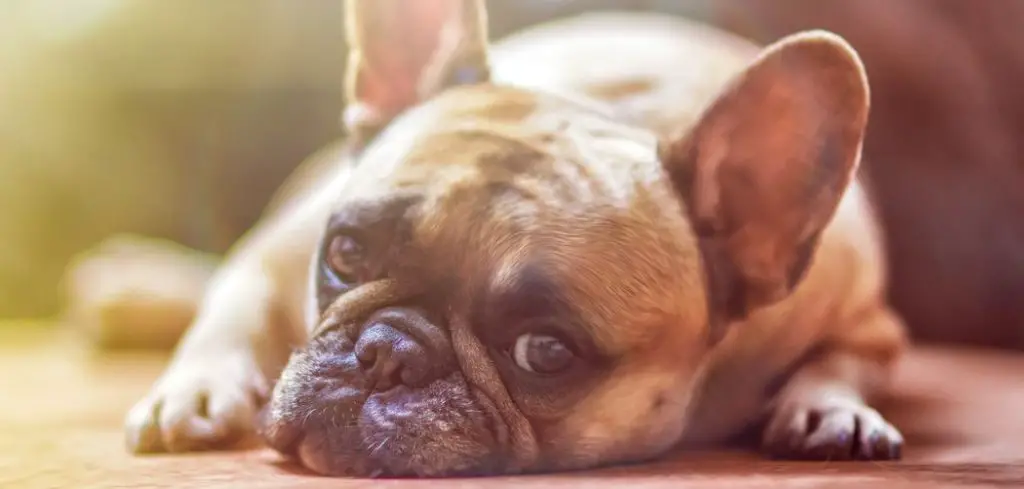If your puppy is having loose stool but it doesn’t look like full-blown diarrhea, it can still be concerning.
Puppies are sensitive and their digestive systems are still developing, so any change in stool consistency can be a sign of something worth watching.
We outline the common causes of a puppy having loose stool that is not diarrhea, what you can do at home, and when to seek veterinary help.
Puppy Loose Stool Not Diarrhea — Why It Happens
Loose stool in puppies that is not diarrhea often happens because their digestive systems are adjusting to changes. It can be triggered by dietary transitions, food sensitivities, stress, or mild infections. Parasites, teething stress, and even overfeeding can contribute to stool that is soft but not watery.
While not always an emergency, it’s important to monitor your puppy closely, since puppies can dehydrate or decline quickly if the situation worsens.

Puppy Loose Stool Not Diarrhea: Common Causes
Dietary Change or Food Intolerance
When you switch your puppy’s food too quickly, their digestive system may not adapt well, leading to soft stools.
Puppies also may have food intolerances to certain proteins, grains, or additives.
Owners often notice that stool becomes loose after trying a new brand of kibble or adding table scraps.
Although this doesn’t always cause diarrhea, it can make your puppy’s stools consistently soft. Left unaddressed, food intolerance can lead to poor nutrient absorption and slower growth.
Read more: Puppy Loose Stool with Mucus (What this could mean)
Parasites
Puppies are especially prone to intestinal parasites like roundworms, hookworms, and giardia. These organisms can disrupt digestion and cause loose stool that may appear greasy or have mucus, but not necessarily watery.
A puppy with parasites may also show bloating, poor weight gain, or scooting behavior. Parasites are serious because they compete with your puppy for nutrients and can weaken their immune system.
Stress and Environment Changes
Stress from moving to a new home, traveling, or being exposed to new people or animals can upset your puppy’s digestive system. This stress can trigger loose stools without causing diarrhea.
Owners might see this when a puppy first comes home from the breeder or shelter. While this stress-related looseness may resolve on its own, it can still leave your puppy uncomfortable.
Overfeeding or Rich Treats
Puppies have small stomachs and sensitive digestive systems. Eating too much food at once or consuming fatty treats can overwhelm digestion, leading to soft stools. This is common in households where training treats are frequent or portions are slightly overfed.
While this type of loose stool often resolves once the diet is corrected, repeated overfeeding can put strain on the digestive system and contribute to unhealthy weight gain.
Teething and Chewing Behavior
When puppies are teething, they often chew on objects and swallow things they shouldn’t, such as fabric, sticks, or toys. This can irritate the digestive tract and result in softer stools without turning into diarrhea.
Chewing on inappropriate items can also introduce bacteria into the gut, which adds to stool inconsistency. Monitoring what your puppy chews is key to preventing ongoing issues.
Mild Infections
Not all infections cause explosive diarrhea. Some mild bacterial or viral infections can cause softer stools while your puppy’s body works to fight them off.
Puppies may act fairly normal otherwise, with only minor digestive changes.
While many of these cases resolve naturally, a puppy’s weaker immune system can allow things to worsen quickly, so keeping an eye on hydration and energy levels is crucial.
What to Do If Your Puppy Has Loose Stool Not Diarrhea
If your puppy’s stool is loose but not diarrhea, you can often support them at home. Start by reviewing their diet and make sure no sudden changes have been introduced. If you recently switched foods, transition more gradually by mixing old and new food over 7–10 days.
Offer your puppy plenty of fresh water, since softer stools can still lead to mild dehydration. Small, frequent meals of their regular food are better than large meals.
Avoid giving extra treats, table scraps, or new chews until their stool firms up. Keeping things consistent helps their digestive system settle.
You can also ask your vet whether a puppy-safe probiotic would help balance gut bacteria. For stress-related loose stool, try to keep their environment calm and predictable.
When to Call or Visit Your Vet
Even if the stool isn’t watery diarrhea, some signs mean you should contact your vet. If your puppy’s loose stool continues for more than 2–3 days, it’s important to rule out parasites, infections, or food allergies.
If you notice blood, mucus, or a foul odor in the stool, seek veterinary care right away. These can signal a more serious infection or parasite load.
Other red flags include lethargy, vomiting, loss of appetite, bloating, or rapid weight loss. Puppies can decline quickly, so don’t wait if your puppy is showing more than one symptom alongside loose stool.
Because parasites are so common in puppies, a stool sample test at the vet is often recommended, even if your puppy otherwise seems healthy.
Read more: Puppy Loose Stool with Blood (Why this happens)
Key Takeaway
Puppy loose stool not diarrhea is usually caused by diet, stress, parasites, or mild digestive upset. While it doesn’t always signal a medical emergency, monitoring your puppy closely is essential.
Keep their diet consistent, provide clean water, and avoid overfeeding or rich treats. If the problem lasts longer than a couple of days or is paired with other symptoms, contact your veterinarian.
With the right care and attention, most puppies bounce back quickly and return to normal, healthy stools.
